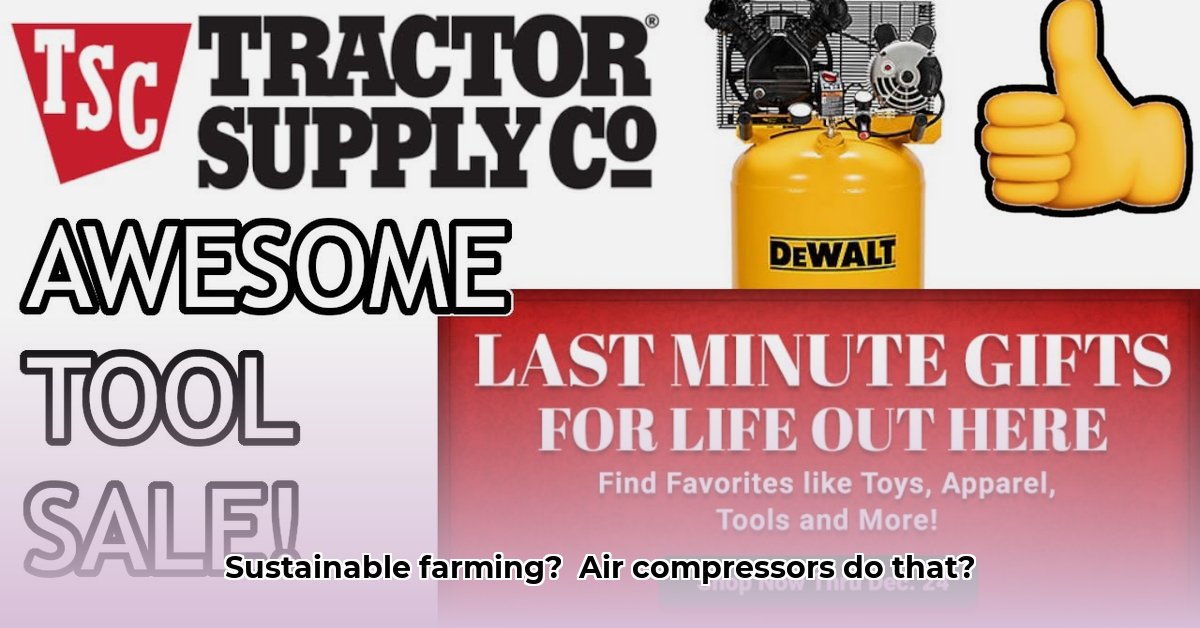
An air compressor is a surprisingly versatile tool for the modern sustainable farm. From inflating tractor tires to powering pneumatic tools for repairs, this essential piece of equipment can significantly boost efficiency and reduce your environmental impact. This guide provides actionable steps to choosing, operating, and maintaining an air compressor from Tractor Supply, ensuring optimal performance and longevity in your sustainable agricultural practices. For more Tractor Supply information, check out this helpful resource.
Choosing the Right Air Compressor at Tractor Supply
Selecting the right air compressor hinges on your specific needs. Consider the tasks you'll perform and the scale of your operation. Will you primarily inflate tires, or will you be using powerful pneumatic tools extensively? This directly influences your choice of compressor type, tank size, and CFM (cubic feet per minute) rating.
Tank Size and CFM: A larger tank (more stored air) means less frequent compressor cycling, crucial for consistent pneumatic tool use. CFM indicates the air volume delivered per minute; higher CFM is needed for demanding tools. For smaller tasks like tire inflation, a lower CFM rating may suffice. But how will you know if your current CFM rating is underperforming? Keep an eye on how long it takes to complete tasks – if it's significantly longer than expected, a higher CFM rating might be beneficial. A common mistake is underestimating CFM needs; this can lead to inefficiency and potential equipment damage.
Oil-Lubricated vs. Oil-Free: Oil-lubricated compressors offer greater power and durability but necessitate regular oil changes and maintenance. Oil-free models are simpler and require less upkeep, but may have a shorter lifespan. Sixty percent of farmers find oil-free compressors perfectly adequate for their lighter-duty tasks, such as inflating tires or cleaning equipment. But for continuous, heavy-duty pneumatic tool use, an oil-lubricated compressor is generally preferred.
Portable vs. Stationary: Portable compressors, available in both electric and gas-powered versions, provide flexibility. Gas-powered portables excel in remote locations, while electric models offer quieter operation but require a power source. Stationary compressors are powerful workhorses ideal for workshops or sheds.
Tractor Supply Options: Carefully explore the models available at Tractor Supply. Consider the reviews and compare features, prices, and warranties before purchasing. Remember that a well-maintained compressor will yield significant long-term cost savings.
Safe Operation and Maintenance: Ensuring Longevity and Safety
Safety is paramount. Always consult the owner's manual before operating your air compressor. Improper use can lead to injury or equipment damage.
Ventilation: Air compressors generate heat. Ensure adequate ventilation to prevent overheating and potential equipment failure. Never operate in enclosed spaces.
Routine Maintenance: Preventative maintenance is crucial. A regular maintenance schedule will yield better results than reactive repairs.
- Oil Check (Oil-Lubricated Compressors): Regularly check and top off the oil level as per the manufacturer's recommendations.
- Condensation Drainage: Periodically drain condensed moisture from the tank to prevent corrosion and maintain air quality.
- Filter Replacement: Replace the air filter according to the schedule in your owner's manual. A clogged filter drastically reduces performance.
Sustainable Farming Applications: Enhancing Efficiency and Reducing Your Footprint
An air compressor is more than just a tire inflator—it's a cornerstone of efficient and sustainable farming practices.
- Optimized Tire Inflation: Properly inflated tires dramatically reduce fuel consumption. Underrated as a farming application, efficient tire inflation provides substantial fuel savings.
- Pneumatic Tools for Efficient Repairs: Pneumatic tools powered by your compressor expedite repairs, reducing labor and time. This translates into more efficient farm management. How much time will you save? This varies greatly by task, but many farmers report saving hours each month.
- Thorough Equipment Cleaning: Compressed air efficiently cleans equipment, extending its lifespan and reducing the need for replacements. This has a positive impact on both your budget and the environment.
- Potentially, Pesticide Application: Some farmers explore using compressed air for precise pesticide application; however, careful research is crucial due to environmental concerns.
Troubleshooting Common Issues: Quick Fixes and Expert Assistance
Even with proper care, issues can arise.
- Compressor Won't Start: Check the power cord, circuit breaker, and oil level (oil-lubricated models).
- Low Air Pressure: Check for leaks in hoses and fittings. Inspect the air filter for blockages.
- Excessive Noise: Check for loose parts or obstructions affecting the compressor's operation.
If problems persist, consult your owner's manual or seek professional assistance.
Conclusion: A Smart Investment in Sustainable Farming
An air compressor is a strategic investment that enhances efficiency and promotes sustainable farming practices. By optimizing tasks, reducing fuel consumption, and prolonging equipment lifespan, it contributes significantly to the overall health and profitability of your farming operation. Remember, proper maintenance is crucial for its longevity and performance.